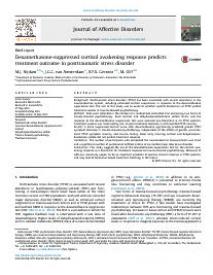Dexamethasone-suppressed cortisol awakening response predicts treatment outcome in posttraumatic stress disorder
Background
Posttraumatic stress disorder (PTSD) has been associated with several alterations in the neuroendocrine system, including enhanced cortisol suppression in response to the dexamethasone suppression test. The aim of this study was to examine whether specific biomarkers of PTSD predict treatment success in trauma-focused psychotherapy.
Methods
Data were collected in the context of a randomized controlled trial comparing two forms of trauma-focused psychotherapy. Basal cortisol and dehydroepiandrosterone sulfate levels, and the response to the dexamethasone suppression test were assessed pre-treatment in 24 PTSD patients. Treatment success was measured by pre- to post-treatment decrease in self-reported PTSD severity.
Results
A more suppressed cortisol curve after dexamethasone significantly predicted greater PTSD symptom decrease in trauma-focused psychotherapy, independent of the effects of gender, pre-treatment PTSD symptom severity, and trauma history. Basal early morning cortisol and dehydroepiandrosterone sulfate did not predict treatment response.
Limitations
The number of participants who completed the neuroendocrine measurements was small and a significant number of participants fulfilled criteria of co-morbid major depressive disorder.
Conclusions
This study suggests the use of the dexamethasone-suppression test for the cortisol awakening response as a biomarker for treatment response to trauma-focused psychotherapy. Measures of HPA-axis sensitivity appear to be an important predictor of positive clinical response in PTSD patients, and may lead to biomarker-based treatment matching in the future.
Geachte bezoeker,
De informatie die u nu opvraagt, kan door psychotraumanet niet aan u worden getoond. Dit kan verschillende redenen hebben,
waarvan (bescherming van het) auteursrecht de meeste voorkomende is. Wanneer het mogelijk is om u door te verwijzen naar de bron
van deze informatie, dan ziet u hier onder een link naar die plek.
Als er geen link staat, kunt u contact opnemen met de bibliotheek,
die u verder op weg kan helpen.
Met vriendelijke groet,
Het psychotraumanet-team.
Reference:
M.J. Nijdam, J.G.C.van Amsterdam, B.P.R.Gersons, & M.Olff | 2015
IN: Journal of Affective Disorders, ISSN 0165-0327 | 184 | 205–208
http://www.sciencedirect.com/science/article/pii/S016503271500364X
IN: Journal of Affective Disorders, ISSN 0165-0327 | 184 | 205–208
http://www.sciencedirect.com/science/article/pii/S016503271500364X


